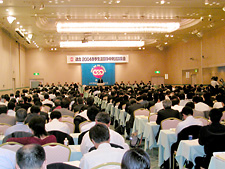Let Spring Struggle Bring Back a Japan Where People Can Live Happily, Securely
(11 Nov 2003)
 |
| Photo: Various opinions were presented on the demands contents. (October 30, Tokyo) |
It was decided to fully enforce the penetration of ňMinimum Wage Movement issues” activities into unit union workplaces and will improve labor conditions especially through enhancing joint struggles among small to mid-sized local unions.
Deliberation over the contents will be held at a meeting of labor condition officers, the small to mid-sized union labor committee, the labor condition committee, and the Central Executive Committee, at which point it will be endorsed as ňSpring Struggle Policy” at the 41st Central Committee on November 21.
At the outset of the rally, RENGO President Sasamori stated that “Our current economic recovery is based on profits made from the sacrifices of the working people and has taken its toll in a variety of ways on the workers. No real economic recovery can be possible under such conditions. The basic goals of the upcoming 2004 Spring Struggle are for a better life to resolve worries over employment, the future and security, all of which hang like a cloud over Japan; to stem the deterioration of jobs and living standards; and to bring back a Japan where people can live happily and securely. Making this Spring Struggle a labor movement where we get answers, we will push ahead with activities that will decide the fate of the revival of labor movements.”
Sasamori further entreated participants, saying “issues involving the economy, social security system including pensions and taxes are also important Spring Struggle activities, as are those high priority issues for the upcoming election. The upcoming election is crucial in order to build the kind of society we want, so please call on all members at every workplace to vote.”
A proposal on the basic concept was presented by General Secretary Kusano, after which followed an explanation of the concrete demands and the results of study on the RENGO Minimum Wage Project by RENGO Working Conditions Division Director Yamaguchi. Then the following opinions were raised during the general deliberation.
Opinions on wage demand standards were presented asking that easily understandable goals for small to mid-sized unions should be established. JAM (Japanese Association of Metal, Machinery and Manufacturing Workers’ Union) said that “regardless of whether there is a wage system in place or not, we want RENGO to set clear benchmarks for wage increase demands for small to mid-sized businesses.
RENGO Labor Conditions Committee Chair Koga stated that “in the discussions up to this point, there have been various opinions presented on whether or not we should set uniform standards for wage demands. Based on these opinions, we endorse the conducting of uniformed activities for issues on the Minimum Wage Movement and focus on improving and supporting the entire framework more than ever before.” Meanwhile, another opinion was presented by DENKI RENGO (Japanese Electrical Electronic & Information Union), saying “to further improve the Spring Struggle, we must put all our effort into establishing the issues of Minimum Wage Movement with our members.”
Other opinions included those on the results of the “living standard guarantee levels (RENGO Living Wage)” study released this year, UI ZENSEN DOMEI (The Japanese Federation of Textile, Chemical, Food, Commercial, Service and General Workers’ Unions) said “levels should not be presented by hourly amounts but rather by monthly monetary amounts.” RENGO Kochi expressed its opinion by stating “we want RENGO to provide materials on precedents on such matters as relations to public contracts and so forth in order to clarify things.”
Regarding the equal treatment of part-time workers, ZENKOKU UNION (ZENKOKU Community Union Association) questioned “whether part-time workers wages should be compared with starting salaries,” and SERVICE RENGO (Japan Federation of Service and Tourism Industries Workers’ Unions) expressed their opinion by saying “we should raise issues concerning the Labor Standards Law, to be revised next year, and the Worker Dispatch Law.”
After listening to all of these opinions, General Secretary Kusano said, “we will report and deliberate on the opinions presented here at oncoming organizational meetings.” He continued by saying, “although we are under incredibly severe circumstances, we are working to make this a dynamic Struggle and are grateful for your cooperation and support.” After which he closed the rally.